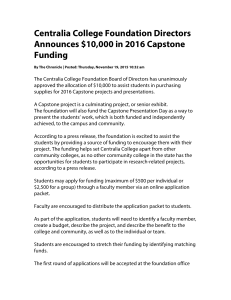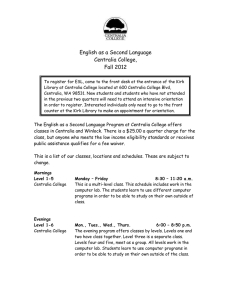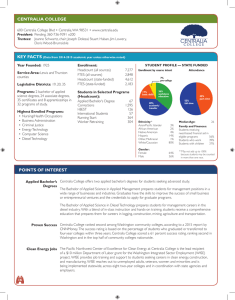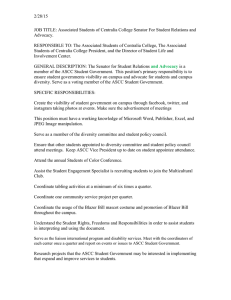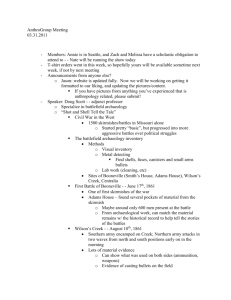Library and Information Resources
advertisement
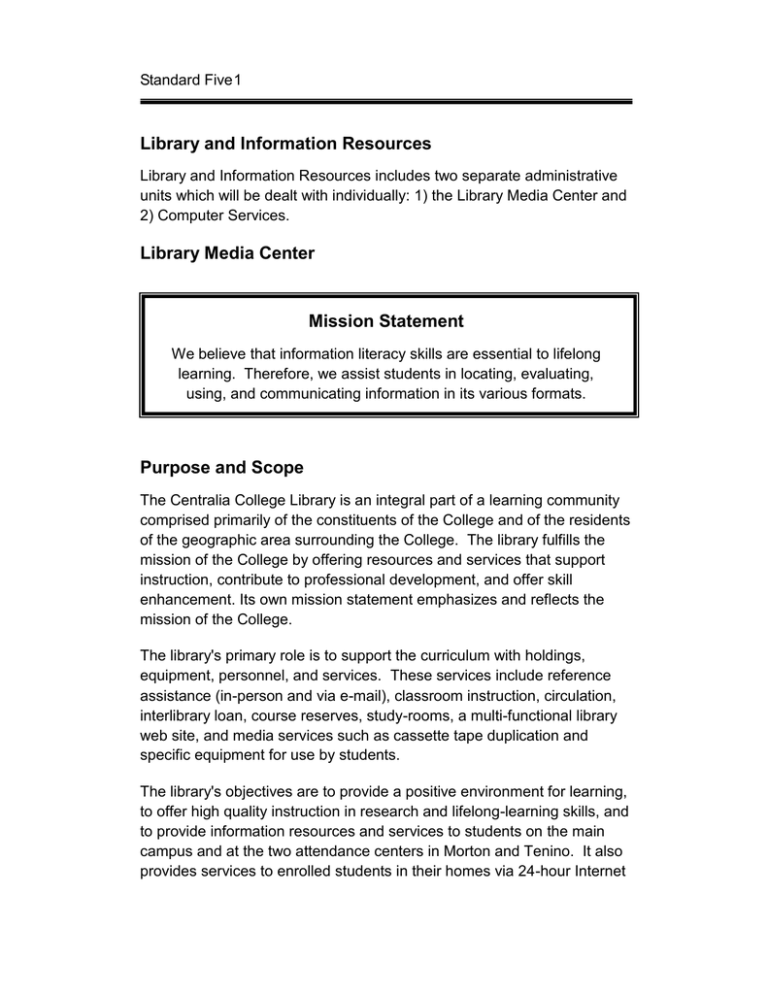
Standard Five 1 Library and Information Resources Library and Information Resources includes two separate administrative units which will be dealt with individually: 1) the Library Media Center and 2) Computer Services. Library Media Center Mission Statement We believe that information literacy skills are essential to lifelong learning. Therefore, we assist students in locating, evaluating, using, and communicating information in its various formats. Purpose and Scope The Centralia College Library is an integral part of a learning community comprised primarily of the constituents of the College and of the residents of the geographic area surrounding the College. The library fulfills the mission of the College by offering resources and services that support instruction, contribute to professional development, and offer skill enhancement. Its own mission statement emphasizes and reflects the mission of the College. The library's primary role is to support the curriculum with holdings, equipment, personnel, and services. These services include reference assistance (in-person and via e-mail), classroom instruction, circulation, interlibrary loan, course reserves, study-rooms, a multi-functional library web site, and media services such as cassette tape duplication and specific equipment for use by students. The library's objectives are to provide a positive environment for learning, to offer high quality instruction in research and lifelong-learning skills, and to provide information resources and services to students on the main campus and at the two attendance centers in Morton and Tenino. It also provides services to enrolled students in their homes via 24-hour Internet Standard Five 2 access to full-text databases, electronic reference sources, and catalogs. (Required exhibits for this standard are available in the campus exhibit room.) Collections The Centralia College Library has a diverse collection of books, media resources, and equipment. However, with the increased obligations of technology and an expanding diversity of students and branch campuses, the library has had a challenge keeping up with institutional requirements. The library's book and media collections, equipment, and personnel are stretched to support all the programs offered by the institution at all locations. As stated in the Association of College and Research Libraries (ACRL) Standards for Community, Junior, and Technical College Learning Resource Programs, "the materials in the collection will become stagnant without a three to five percent replacement of older materials each year." This goal has become difficult with print materials, but some are now available through online resources. Budget Today's library is no longer a collection of print materials with a central card catalog. Library offerings have diversified and library personnel have had to incorporate technological expertise along with traditional librarianship. Because of the many new demands and opportunities for the library, the library's budget is stretched to maintain a current print collection to support existing courses and to support new courses and programs. Changing technology is forcing librarians to re-evaluate their objectives and responsibilities. In order to support the expansion of technology in the library, the College purchased only $5,000 worth of print and media materials during 19981999. The bulk of the budget purchased new computers and financed the Standard Five 3 College's share of the Voyager Integrated Library System, a support to the full text online database and catalog system. The challenge of balancing technology needs and print material needs continues to strain the library budget. While some technology essentials are met via technology fee funds, the library budget is responsible for expanding technological research services, paying for subscriptions to online products, and for print, video, and audio materials. Collection Acquisition Library materials are selected, purchased, and maintained as current funds permit. Collection development responsibilities are divided among the librarians. New materials are chosen on the basis of reviews and recommendations. The library staff actively encourage faculty involvement in collection development, and faculty purchase requests for curriculum materials are given first priority. Suggestions from students and staff are also welcomed. Faculty members have regularly been invited to accompany librarians on book-selecting trips to bookstores in Portland. In addition, instructors help maintain the quality and currency of the collection by reviewing the books and media materials in their disciplines in order to weed and augment the collection. Library collections are "weeded" to remove materials that are no longer current and accurate, have not circulated, or are in poor condition. Weeding duties are divided among the librarians, with at least one section being done each year. A faculty member who is expert in the subject matter is invited to participate. In 1997-98, 151 books and 30 non-print materials were withdrawn (including lost and damaged items). Periodicals The College's periodical resources are more than sufficient to support the academic curriculum. The library has eliminated many subscriptions to Standard Five 4 periodicals in paper and microfilm format that are now available in full-text databases. These databases have significantly expanded the number of periodical titles available to students and faculty. In 1993, the library offered 256 paper and/or microfilm titles; whereas in 1999, the library offers over 2000 titles. The cooperative purchasing on a statewide level has enabled the College to cut costs, and the library continues to review paper and microfilm subscriptions twice a year in order to avoid unnecessary duplication. Policies The library has established written policies and procedures for the development and management of its information resources. Notebooks containing these policies and procedures are kept at the circulation desk and are available to everyone. The policies and procedures are reviewed, updated, and augmented by the librarians at least once a year, most recently in March 1999. In addition, computer-use and study-roomuse policies are posted in appropriate locations. Library Computing Resources The Centralia College Library has a collection of desktop computers connected to the Internet and equipped to utilize the automated library resources. The primary uses of the library computers are to teach students how to conduct electronic library research and full-text retrieval. There are approximately 250 networked student computers in computer labs which have access to the library resources homepage. Half of these are available to the student body during normal college hours and the other half are restricted for use in certain programs. The faculty and staff have a combined 300 networked computers that are capable of being utilized as library researching stations. The more than 550 network-enabled computers owned by the College provide a formidable set of tools for supporting library research. The Standard Five 5 challenge to the library staff is two-fold: 1) train individuals to use the research power of the Internet; and 2) obtain funding for expanded use of subscription services that best fulfill the needs of the users. The Library has a virtual library always open via the College website. From this website faculty, staff, and students are able to: contact a librarian get information about library hours, policies, and staff use the electronic reserves link to other regional and national library catalogs search periodical databases and online reference resources receive guidance on doing research see a sample term paper with bibliography. As of March 1999, college patrons have access to Voyager, an integrated library system that will enable patrons to check Centralia College's catalog as well as catalogs of other community college libraries. The Centralia College Library is also a member of the OCLC/WLN interlibrary loan subsystem (a database containing the holdings of 33,000 member libraries from around the world) and obtains needed materials from other libraries at no charge to students, faculty, and staff. Satellite Center Access Satellite centers in Morton (CC East) and Tenino have access to the library collections and services via the Internet. Students at these sites can print material from Britannica Online, the two periodical databases, ProQuest Direct and Ebsco Host, numerous online periodicals, and the World Wide Web. There are 24 computers in Morton and 12 in Tenino. CC East also has a very small assortment of reference books, and other materials, if requested, are sent from the main campus. Because Centralia College cannot afford to staff the satellite centers with a reference librarian or to provide on-site collections of any size, an Standard Five 6 outreach librarian is available for research instruction on-demand. Students may also request online reference services via e-mail. Equipment and Materials Centralia College Library maintains 21 computers with 10 for student use. In addition, the book collection has 45,719 volumes. It subscribes to 157 paper periodicals, 129 microfilm periodicals, and 2,137 periodicals electronically. In 1999, the College was awarded grant monies to purchase materials concerning the gay, lesbian, bi-sexual, and transgender populations. There was also money allocated to buy materials for a literacy collection used primarily by ABE and ESL students. Presently, the library is seeking grants and outside funding sources to bolster targeted collections so the needs of the College’s diverse student population are met. The Media Center maintains TVs, VCRs, screens, and overhead projectors for campus classrooms. Today, the library also provides several types of media equipment for short-term loan to faculty and staff including overheads, slide projectors, laser disk players, and screens. In addition, students may borrow CD players for in-library use. The Library staff strives to help patrons use the library resources effectively and independently through one-on-one instruction and group and class instruction. Orientations and in-depth research skill instruction are provided for all levels from high-school completion to second year classes in the academic programs. A one-credit class, Library 181: Library and Internet Research Skills, was taught from September 1996 through June 1998. This class was usually linked with another class such as English, foreign languages, humanities, business, and statistics. Workshops are presented for faculty and staff during "faculty days" prior to the start of each academic year. A two-credit online version of Library and Internet Research Skills offered to students began winter quarter 1999. In addition, the library staff writes a regular column in the student Standard Five 7 newspaper and TLC Newsletter to disseminate library news and provide instruction. Facilities and Access Centralia College provides facilities for library resources, equipment, and personnel. The present library building was completed in 1990 with approximately 25,000 total square feet. The building is shared with the Learning Resources and the Counseling/Career Center. At the present, approximately one half of the building is devoted to library functions, and the facilities are adequate. The library's resources are available to all students, faculty, and staff. It is open 59 hours per week during the fall, winter, and spring quarters with reduced hours during summer quarter and inter-sessions. Since 1990, the library has added seven hours per week by remaining open until 7:30 p.m. four nights a week instead of two. The library has a policy of having one reference librarian on duty when the library is open. On one hand, the 24-hour-a-day accessibility of the web site has allowed availability without added personnel, but reference assistance duties and teaching responsibilities have increased with the advent of so many electronic research tools, such as online catalogs, periodical databases, and reference sources. The web site can be accessed from any computer on the main campus or from off-campus. Off-campus accessibility requires a password which is available to all registered students, faculty, and staff. In addition to Centralia College resources, Centralia has several formal and informal cooperative arrangements with other libraries. It is a member of the OCLC/WLN interlibrary loan subsystem, participates in the Statewide Database Licensing Project (a purchasing cooperative of libraries in Washington state), and works with the 20 community college and technical libraries which have joined the Voyager network. The library has informal reciprocity agreements with several other college libraries, so borrowed materials complement and expand the depth and Standard Five 8 breadth of the Centralia collection. These interlibrary loan and database subscriptions expand the library's resources and control costs. Statistics regarding the library collection and its use are available in the Exhibit Room. Staffing All librarians, including the director, have faculty status. One librarian is assigned to serve branch-campus sites, providing instruction and reference assistance as needed. All regular staff are on 10-month contracts, and extended contracts are awarded to cover additional hours. Despite being below national standards, staffing is adequate and effective. All the professional and classified staff members have the requisite education and training to perform their responsibilities as delineated in the job description for each position. Job descriptions are updated frequently to reflect the ever-changing demands of new technology. These rapid technological innovations make it imperative that library staff have ample opportunities to attend training sessions. The library director views training and other forms of professional development as part of the job and encourages librarians to participate in professional organizations and professional conferences. Funds for these activities are allocated for all staff members, classified as well as professional. In addition, Centralia College also offers computer software training sessions for faculty and staff through the Teaching and Learning Center. (TLC) Link to Computer Services Although Computer Services and the Library Media Center are separate entities, they work together to support the accomplishment of the institutional mission and goals. Computer Services provides hardware maintenance and repair and advises the library staff about software and hardware purchases. The manager of the computer labs and the library Standard Five 9 director evaluate services offered and designate areas of responsibility. Both make an effort to coordinate policies for student use of resources such as a no-chat policy in the labs and in the library. The library administers Instructional Media, but this function of the library has diminished over the past 10 years. TVs and VCRs (installed in every classroom) have rendered many traditional forms of media, such as filmstrips and 16mm films, obsolete. The library no longer rents films, delivers equipment, or does any media production other than cassette tape duplication. Each classroom has an overhead projector mounted on a cart, and the library checks out slide projectors, extra overheads, a laserdisk player, and special-needs equipment. Librarians serve on committees and have input on curriculum development. One librarian is a member of the Instructional Council, another serves on the Assessment Committee, and the director is part of the Instructional Cabinet. Planning and Evaluation Librarians take part in Centralia College institutional planning by attending faculty meetings, serving on committees, and participating in program review. Library staff have an opportunity to take part in discussions concerning budgets, personnel, curriculum, assessment, and accreditation. The staff in the Library Media Center evaluate their performance according to the primary goal of teaching and learning support. There are quarterly staff meetings to assess and plan future changes and developments. This type of review and evaluation has resulted in two mini-grants from the Assessment Committee to assess student learning in the Library 181 class and to assess the library's entire instructional program. Faculty librarians are also evaluated according to the faculty evaluation process described in Standard 4. Standard Five 10 Library staff have completed several Strategic Planning Action Plan Proposals and Reports over the past two years. These action plans had the following objectives: Improve communication within the library and expand communication to the College community Implement web-based technology that allows students and staff to access library services 24 hours a day Purchase a server and software to make the library catalog accessible from the library home page Provide the online version of Encyclopaedia Britannica to staff and students, both on- and offcampus Moreover, as a result of Internal Climate Surveys conducted at Centralia College in 1995 and 1997, administrators, staff, faculty, and trustees awarded library services a “Very Good” rating. The library staff also plans on finding out the opinions of the students they serve, so they will conduct a library-user survey among the student population. The questionnaire has been approved by the institutional researcher for distribution to all students in the 10 a.m. classes during February 2000. Analysis The library would benefit from increased financial support for the purchase and maintenance of materials, equipment, and media facilities. It can also use additional equipment and collections in order to support the College's curricular offerings. The sciences, social sciences, and especially technical materials, are difficult to keep current and comprehensive. The collection continues to need more information about other cultures, countries, minorities, and lifestyles. The issue of library security needs to be addressed since one of the concerns of the staff is the accessibility to library materials when the building is open, but the library is closed. The Library and Learning Resources directors are working to resolve this issue. Standard Five 11 Insufficient library staffing was mentioned in the last accreditation report, and since then the College has added 1.1 FTE librarians. However, according to ACRL standards for community college libraries, Centralia College still employs an inadequate number of library staff. In addition, there is a 30% secretary and 120 hours of student assistant help. Student opinions and suggestions are solicited during class instruction, but an official user survey needs to be conducted on a regular basis. Computer Services Centralia College offers a wide variety of computing resources, as well as Internet and Intranet services to students, faculty, and staff. These services support curricular offerings, including those at outreach locations. The College operates 10 servers in support of approximately 600 computers that utilize Apple and PC compatible technology in both desktop and laptop configurations. Servers provided for the delivery of instruction support activities as diverse as Unix, e-mail for students, File, Print, Application, Online threaded discussions (Centralia Talk!), web creation, and web-site management. Servers provided for administrative purposes support e-mail for faculty and staff, as well as faculty and staffdeveloped web pages, calendar and group scheduling, a file server, and a Listserv/Reflector. The College has a T-1 connection to the K-20 statewide network, which in turn allows connection to the Internet. Centralia College East and the Tenino Center are connected to the main campus by T-1 lines. The main campus has a fiber optic backbone that connects each building to a central hub in the Student Services Building. Within the buildings there is CAT-5 cabling to every office and classroom. Currently, Ethernet is used as the network standard, but the installed cabling can support technology with greater capacity. Six general purpose labs equipped with over 150 Windows-based PC computers and one campus lab with Macintosh computers are available for student use. The main campus computer labs in the Business and Standard Five 12 Office Occupations Building operate from 7:30 a.m. to 8 p.m. (5 p.m. on Fridays) and from 9:00 a.m. to 5 p.m. on Saturdays. The library also offers Windows-based PCs in carrel stations for student research. Students have access to the World Wide Web and e-mail services and must first sign a Centralia College Network and Electronic Mail Acceptable Use Policy Agreement. Staffing The Technology & Computer Service Center (T & CS) administers the entire college computer system with nine employees and five part-time student workers half of which are supported by the Instruction budget. The T & CS consists of the following positions: Director Network Administrator/Systems Analyst Equipment/Software Consultant Helpdesk Coordinator Computer Service technician Teaching and Learning Center consultant 3 computer lab supervisors 5 student lab assistants Of this staff, two are dedicated to servicing the College’s administrative computing users and student labs not managed by the three computer lab supervisors. The ratios for full-time equivalent tech support (FTETS) to computer are 1 to 75 for supervised labs, and 1 to 300 for the rest of the College. The lab ratio is adequate; the non-lab ratio indicates inadequate coverage for the computer inventory. Financial Support Financial support for the campus computer system comes from three sources: Line-item funding for portions of staff Annual fees assessed for each computer Standard Five 13 Service charges and reimbursements for requested expenditures. With the majority of the financing derived from fees and reimbursements, the primary direction for this program comes from the computing services spending patterns of the instruction, student services, and administrative areas. Technology Committee The Technology Committee guides campus computing with representation from all segments of the College community. One of the roles of this committee is to evaluate the effectiveness and completeness of computer support and address resource issues when program deficiencies are identified. Computer Support Each full-time faculty member has a Macintosh or PC available for office use, and most adjunct faculty have at least the opportunity to share a computer in a group office-setting. Full-time and adjunct faculty have access to the Internet and e-mail services provided they sign a Centralia College Network and Electronic Mail Acceptable Use Policy Agreement. In addition, the Teaching and Learning Center is an advanced technology laboratory with a full-time staff member who assists faculty in exploring educational technology and in preparing computer-based teaching materials and presentations. Specialized computer labs on the main campus are dedicated to the support of some campus academic or technical programs, especially music, computer graphics, electronics, computer science, and civil engineering. Standard Five 14 In addition, there are Windows-based PCs available for student use at the Tenino Center and Centralia College East in Morton. Both have on-line access to the web and the Centralia College Library. Analysis Technological changes and advancements are on-going, so the difficulty of keeping up with the financial commitment and staff development require constant monitoring and budget prioritizing. Staff must maintain their expertise through training, in-service, and workshops which demand additional time as well as compensation. The lure of private industry also makes it difficult to keep some staff for any length of time. Their duties include knowledge of software, hardware, and the maintenance of equipment. With approximately 900 on-campus and off-campus computers, the logistics for maintenance, renewal, and acquisition remain a challenge. Computer Services has tried to meet the needs of the campus by creating a Helpdesk, a hotline to report computer problems. It has also put technicians on call during certain hours of the day. An evaluation of the effectiveness of these services needs to be conducted. Standard Five Future Directions Sustain allocated monies for the upgrading of librarian and computer technician skills and expertise. Continue to build a quality reference section. Evaluate the need for additional staff. Establish a process for funding Technology and Computer Services as an institutional commitment in order to eliminate fees for service structure.
